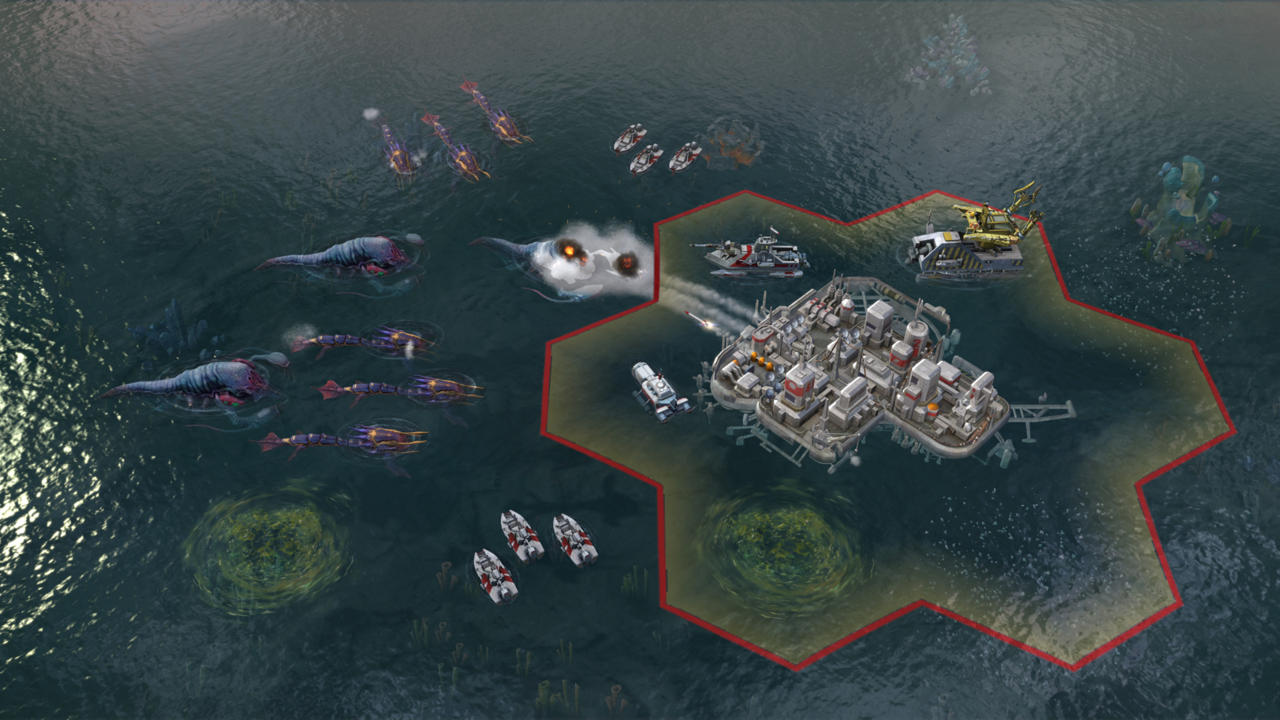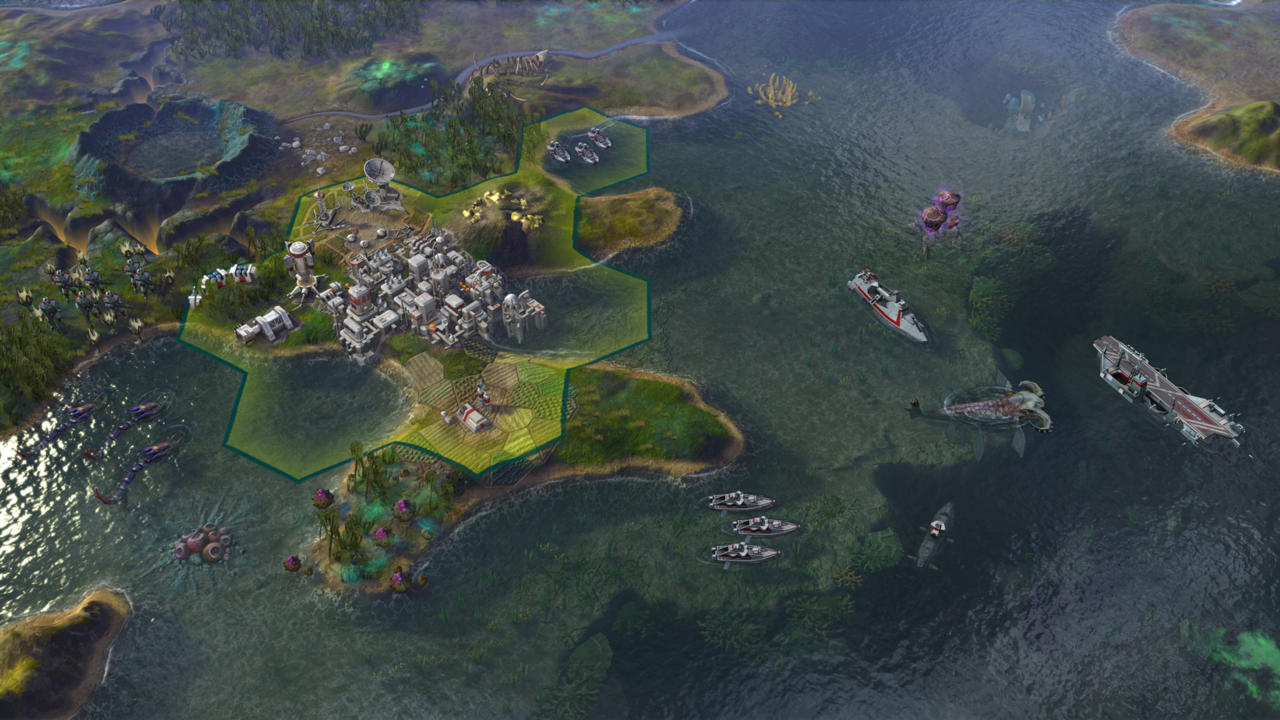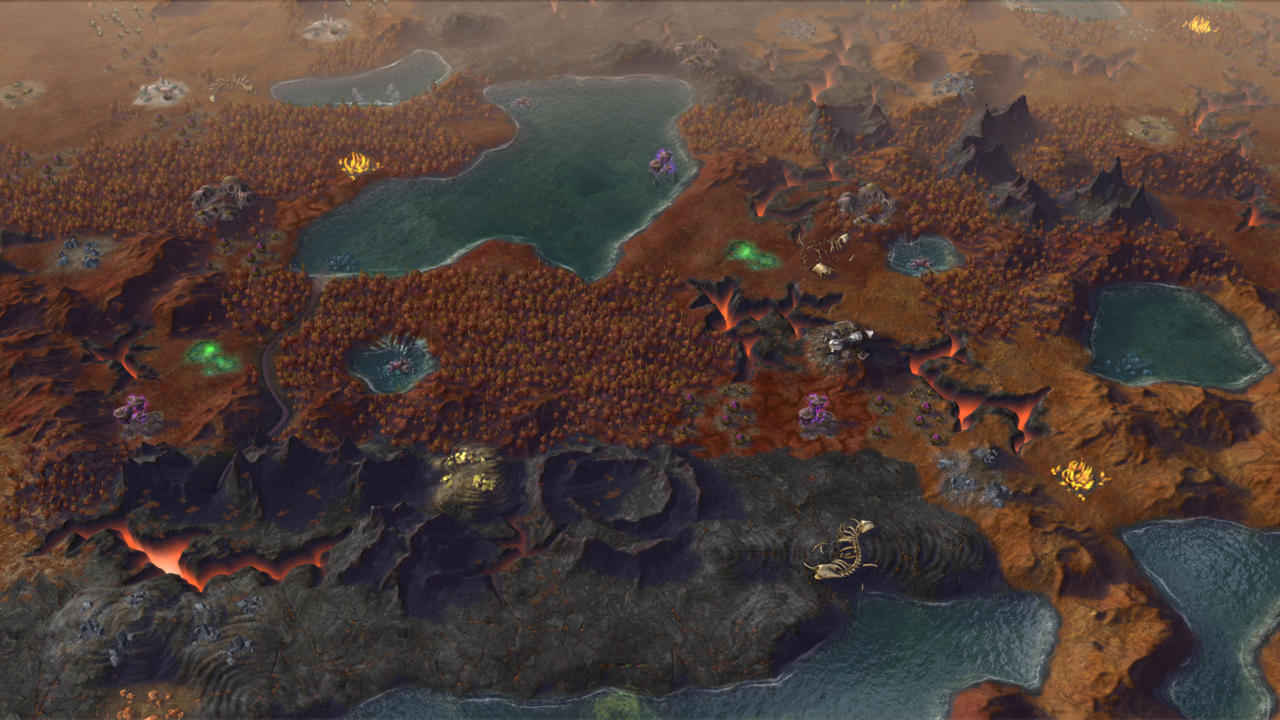Video games have offered us some compelling visions of the future of human habitation. Some seem idyllic, like the glistening arcologies of SimCity 2000. Others imagine a darker fate, like the makeshift subway settlements of Metro 2033. But perhaps the most intriguing have been those that look to that which covers the majority of our planet's surface for inspiration. The underwater metropolis of Rapture captured our imaginations in BioShock, and now, Civilization: Beyond Earth is preparing to challenge our intellect by asking: "What if you could build cities on water?"
The Rising Tide is the first expansion for Beyond Earth and the first time in the long history of Civilization that water tiles will present the same opportunities as land tiles. Well, not exactly the same. As co-lead designer of Beyond Earth, David McDonough, put it during a recent phone interview, "It's not just moving things out to the water; it's not just blue terrain. We really changed some of the very fundamental ways in which you build cities, capture territory, develop, and grow, so that if you play at sea, you have a whole different strategic landscape."

He then went on describe the litany of core Civilization elements that they marshaled to create "a whole catalog of unique gameplay." Resources, tile improvements, wonders, units, aliens, and territorial control all have to be adapted to make water gameplay viable. You can get a sense of how water cities will start out from the screenshot above, which shows a few new friendly and alien unit types squaring off in battle. And note the new resources that are visible below the surface of the water; though there will be important features at surface level, in shallow water, and in the deeps, McDonough confirmed that "oceanic gameplay is happening on one seamless layer." There's to be no deep sea counterpart to the orbital layer, it seems, but how depth will affect different units and resources remains to be seen.
Historically in the Civilization series, bodies of water have served as barriers to development--areas to be explored, traversed, and patrolled militarily, but not controlled outright. From the screenshot above, it seems that aquatic cities will be able to exert areas of control similar to those of terrestrial cities, but there may be new systems in play as well.
"We're playing with the idea that the ocean is a fundamentally different space, where we build structures differently and we move differently, and ownership and control mean a little bit of a different thing. [Control is] sort of like an area of force that you need to project, rather than staking a claim, fortifying, and digging in." Jockeying for geographical position is an important strategy in early-game Civ, whether you're racing to research the right tech to beat your opponents to new islands, or parking a unit on a narrow isthmus to shut off a whole continent from unwelcome explorers. Without these kinds of bounds, won't oceanic settlement just be a frantic free-for-all land grab?
The strategic richness of terrain is something the developers at Firaxis are keenly aware of, and they are working to make sure that Rising Tide's oceans present a similar density of opportunities and obstacles. Will there be such a thing as impassable water tiles? What will replace roads and magrails as city connectors? Can you land your first outpost at sea? Will resource-agnostic improvements like nodes, domes, and academies have aquatic equivalents? My mind reels with all the strategic implications of expanding to water, but Firaxis is keeping its cards close to the chest for now and McDonough assured me that "just about everything has been slightly moved, in some cases significantly moved, in order to account for water gameplay."

I guess that would have to be true for any in-game system connected with developing cities and moving units around, but what about that most detached and ephemeral of Civilization systems, diplomacy? Has that been tweaked in any way? In the words of producer Andrew Frederiksen, "I think tweaked would undersell it. Diplomacy has been, for lack of a better term, completely ripped out and rebuilt from the ground up." So, that's a yes, then.

The goal, Frederiksen elaborates, is to make diplomacy a more active part of the Civ experience. To that end, The Rising Tide will introduce traits, dynamic descriptors of a given leader's mindset that will change as they adapt to the evolving geopolitical situation. "You might have a leader who has a trait that favors diplomacy and energy, and then, as they move on, they get backed into a corner, so they start swapping out their traits to become more aggressive and more militaristic."
From Frederiksen's description, traits seem like a more flexible version of policies from Civilization V. Where the cost of policies and the fact that only a few policy trees were mutually exclusive often discouraged switching them mid-game, traits are meant to be managed more actively. Like policies, they will come with unique perks and benefits for your civilization, but they will also fuel different kinds of diplomatic interactions. The development team wants to extend your diplomatic dealing beyond war, peace, and trade agreements, and having complementary traits will be a big factor in determining your options with a given leader. What these traits might be, how you manage them, what kind of benefits you'll see, and how they will interact with each other all remain to be seen.
The Rising Tide will also herald the arrival of four new factions; the only leader announced thus far is Arshia Kishk, head of the Al Falah (pictured at right). As Beyond Earth's story tells it, the Middle East was mostly depopulated after The Great Mistake. In the years that followed, a tenacious group of resilient survivors held on and refused to desert their homeland. When they finally managed to fund a spaceship send forth colonists, it wasn't the cryogenic variety that most other civilizations sent. It was a generation ship, meaning that those who boarded it knew they would never see their destination, and those who touch down at the end of the journey have never set foot on a planet before. The three other factions will apparently have similarly fraught origin stories, and each one of them will bring disruptive new strategies into play.
There are a few other changes that The Rising Tide is bringing to Beyond Earth, though details on them are fairly scant at this point. In order to further enrich and incentivize the exploration processes, you will now be able to find artifacts through resource pods, expeditions, and other means. Whether it's alien in origin or a relic from Old Earth, each artifact will have its own story and its own possibilities. You could keep it as is or combine it into a set, provided you find the others needed, and the rewards might include new perks or new buildings.

Along with the new units developed to accomodate aquatic and amphibious gameplay will be new hybrid units that require a blend of different affinity levels to unlock. Spreading your affinity points around may keep you from unlocking the highest level perks and units until very late in the game, but if these new hybrids are powerful in the mid-game, perhaps it'll be a more viable strategy to play the field. And finally, two new biomes are on their way, including the primordial world pictured above. With so much volcanic activity, I asked McDonough if the environment was going to pose a threat beyond that of native aliens and miasma clouds. He said only that they are "in the process of making each biome more unique, and will share more soon."
There are certainly more questions to be resolved, but even what's been shared so far seems to portend a serious shift in the Beyond Earth landscape. In a panel during the Game Developer's Conference in San Francisco this year, McDonough and the other Co-Lead Designer, Will Miller, lamented that they hadn't been bolder in their divergence from the core Civilization formula. The oceanic gameplay of The Rising Tide holds the promise of radically changing the way Beyond Earth plays when it is released in fall of this year, and hopefully we'll get a clearer sense of how it all works in a few weeks at E3.

